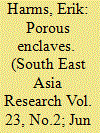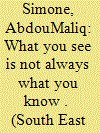|
|
|
Sort Order |
|
|
|
Items / Page
|
|
|
|
|
|
|
| Srl | Item |
| 1 |
ID:
140850


|
|
|
|
|
| Summary/Abstract |
Critical writing on 'new town' developments on the edge of Asian cities emphasizes such negative effects as increased social segregation and exclusion, fragmentation of urban services, upward pressure on peri-urban land prices and loss of productive farmland. While not disputing such critical perspectives, this paper seeks to understand the position of one of Indonesia's pre-eminent developers and new town builders in the overall context of Indonesian development and the ongoing internationalization of real estate development in the region. The developer, known as Ciputra, has long been regarded as a pioneer in the development of Indonesia's real estate industry in general and new town development in particular. This paper examines how Ciputra's work as a developer intersects with the developmentalist goals and efforts of the Indonesian state and how many of these projects, which are commonly understood as exclusive enclaves, may be interpreted as a form of development which may be described as 'market modernism'. Pursuing this analysis, the paper then looks at Ciputra's efforts to internationalize this work and considers where it might fit with notions of national development elsewhere and how it may or may not engage with the transborder expansion of capitalist relations and the increasing commoditization of the Asian city.
|
|
|
|
|
|
|
|
|
|
|
|
|
|
|
|
| 2 |
ID:
140854


|
|
|
|
|
| Summary/Abstract |
In the peri-urban zones of many South East Asian cities, capital has flowed into the development of new, middle class urban enclaves. A significant body of scholarship sees these places as embodying some of the worst elements of American-style suburban, gated communities: sterile, disconnected from their surroundings, isolating wealthy people from the surrounding urban life, etc. While it is no doubt true that such a negative view is frequently warranted, through a closer examination of two projects in peri-urban Hanoi, the authors show that Vietnam's new urban enclaves can hardly be assimilated into the hermetically sealed enclaves described in much of the critical literature. The study cases from Hanoi reveal much more porosity: a strong influence of traditional modes of housing production and allocation, a mixing of built forms and the integration of the new enclaves into the surrounding communities.
|
|
|
|
|
|
|
|
|
|
|
|
|
|
|
|
| 3 |
ID:
140849


|
|
|
|
|
| Summary/Abstract |
Cities across Asia are increasingly dotted with large, upmarket, seemingly homogeneous and avowedly exclusive master-planned, mixed-use housing and commercial developments. From an outsider's perspective, these projects appear starkly uniform and to have been imposed on urban landscapes with little attempt to integrate them into local social, cultural and economic contexts. Recent research in South East Asia, however, shows how these developments are not in fact hermetically sealed from the surrounding world. Instead, they may be productively understood as 'porous enclaves', spaces marked not only by exclusion but by social interaction that cuts across the interfaces of inside and outside, public and private, city and country and local and foreign – all categories presumed to be kept separate in many modern city plans. This introductory article to this special issue on 'Porous enclaves' highlights new research at the interface of the porous city and the enclave, and calls on urban studies scholars to pay close attention to the social life within and among the porous enclaves that have emerged in South East Asia.
|
|
|
|
|
|
|
|
|
|
|
|
|
|
|
|
| 4 |
ID:
140852


|
|
|
|
|
| Summary/Abstract |
A long history of war and revolution in the industrial city of Vinh has perpetuated cycles of mass destruction followed by urban renewal. This paper examines citizen responses to the shift from post-war socialist urbanization that sought to eradicate inequality to post-reform city planning that advocates private property. It asks: how do urban residents at risk of relocation articulate their rights to the post-socialist city? Tracing the use and circulation of bureaucratic artefacts between citizens, developers and the state, it shows how government documents, far from being mere tools of state regulation, are productive of active, participatory subjectivities and a growing sense of moral–political agency. This agency manifests itself in the collective act of petitioning through which residents contest urban redevelopment and the withdrawal of the state by employing the language of tình cam (sentiment) as an affective tool and logic of bureaucratic rationality.
|
|
|
|
|
|
|
|
|
|
|
|
|
|
|
|
| 5 |
ID:
140851


|
|
|
|
|
| Summary/Abstract |
Over the past 30 years, serviced apartment complexes have become one of the defining architectural typologies of Asian urbanization. Relatively unknown before the 1980s, these complexes are designed to accommodate foreign business people, knowledge workers and students for a fixed period, typically three to six months. The rapid expansion of serviced apartments testifies to the substantial increase in the number of people who are working, training and studying outside their home countries, and provides physical evidence of the impact of these short-term populations on the urban fabric of South East Asian cities. Drawing on interviews and fieldwork conducted in Bangkok and Singapore, the paper posits shifts in the design and use of serviced apartments as a useful lens for investigating both the emergence of a geographically mobile middle class and the increase in temporary housing types to meet its residential needs.
|
|
|
|
|
|
|
|
|
|
|
|
|
|
|
|
| 6 |
ID:
140853


|
|
|
|
|
| Summary/Abstract |
Although Jakarta seems to follow in the footsteps of other major Asian cities in its determination to flood the city with mega-developments, there are hesitations and interruptions along this seemingly smooth path. In the majority world, the onus of developing a viable place in the city largely fell to residents themselves, who then proceeded to elaborate intricate social and economic architectures of collaboration whose logics and operations were not easily translatable into the predominant categorizations employed by urban elites and authorities. These elites then attempted to disentangle these relationships, prioritizing the need for visibility, even as their own methods for retaining control were, themselves, usually opaque. This article explores how these ambiguous modalities of visibility are being reworked in contemporary Jakarta.
|
|
|
|
|
|
|
|
|
|
|
|
|
|
|
|
|
|
|
|
|